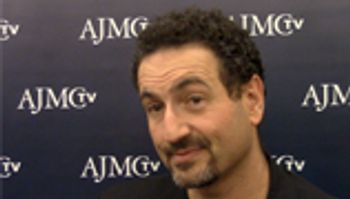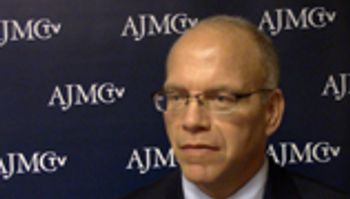
Of the many benefits that come from achieving a 4-star CMS rating or better, retention and growth are probably the biggest ones, according to Snezana Mahon, PharmD, senior director Medicare solutions at Express Scripts.

Of the many benefits that come from achieving a 4-star CMS rating or better, retention and growth are probably the biggest ones, according to Snezana Mahon, PharmD, senior director Medicare solutions at Express Scripts.

CMS audits have found that some health insurance plans are struggling with the same issues year after year, which is concerning, said Sarah J. Lorance, vice president of Medicare compliance at Anthem.

As the healthcare industry moves to a more consumerism based environment, the number one goal for health plans is to have affordable options, explained Karen Ignagni, president and chief executive officer of America's Health Insurance Plans.

Despite being used to dealing with drugs that are incredibly expensive, the high cost of Sovaldi presents a new problem for state Medicaid programs, according to Matt Salo, the executive director of the National Association of Medicaid Directors.

In order to reign in high costs of care in oncology, the healthcare community needs to be able to define value better, according to Alex Bastian, MBA, senior vice president at GfK.

Recent important changes in oncology have led to major advances that allow providers to recommend very specific therapies, said Mark G. Kris, MD, William and Joy Ruane chair in thoracic oncology at Memorial Sloan Kettering Cancer Center.

As the rate of chronic diseases has increased, so has interest in treating mental health issues, Brenda Reiss-Brennan, PhD, mental health integration director at Intermountain Healthcare, said at the US News Hospital of Tomorrow conference.

There are many dimensions to providing quality cancer care, but they're always tied to aligning the best outcomes with the patient's preferences, Peter P. Yu, MD, FASCO, 2014-2015 president of ASCO, said at the Patient-Centered Oncology Care meeting.

There are a couple of areas where interoperability can still be improved, which requires work from both the private and the public sector, said Steven Posnack, MS, MHS, director of the Office of Standards and Technology at the Office of the National Coordinator for Health Information Technology.

No entity in healthcare should have a blank check, but that's the current situation with specialty drugs, said Karen Ignagni, president and chief executive officer of America's Health Insurance Plans.

The evolving field of precision medicine is very much reliant on diagnostics, Howard K. Kaufman, MD, FACS, chief surgical officer and associate director for clinical science at Rutgers Cancer Institute of New Jersey, said at The American Journal of Managed Care's Patient-Centered Oncology Care meeting.

Health reform has brought a number of large changes to how healthcare is delivered, and one of the biggest is the shift to consumerism, according to Andrew Sussman, MD, president of MinuteClinic and senior vice president and associate chief medical officer of CVS Caremark.

Robin Henderson, PsyD, always thought the mind and body were connected, but now it finally seems as if the rest of the healthcare industry has caught up.

People in healthcare are learners by nature, which should be put to use when developing tactics to gain care delivery efficiencies, said Jordan Asher, MD, chief medical and chief integration officer at MissionPoint Health Partners.

The current environment is a difficult time for hospitals and health systems that are trying to do well while also starting to transition to a value-based payment system, explained Robert Pendleton, MD, chief medical quality officer for University of Utah Healthcare.

Although, the recent string of national tragedies has brought attention to behavioral health, healthcare reform has had an even larger impact on people talking about behavioral health, according to John Santopietro, MD, chief clinical officer of behavioral health at Carolinas HealthCare System.

One of the challenges of having interoperable healthcare systems includes perfecting patient matching so the right information connects with the right consumer, according to Karen B. DeSalvo, MD, MPH, former national coordinator for health information technology.

Knowing which patients will benefit the most from health-related apps can be difficult, according to Michael Seid, PhD, director of Health Outcomes and Quality of Care Research at the James M. Anderson Center for Health Systems Excellence at Cincinnati Children's Hospital Medical Center.

One of the most exciting takeaways from the ACO and Emerging Healthcare Delivery Coalition is the concept that stakeholders in many facets of healthcare are coming together to make a success out of the accountable care organization revolution, said moderator Leonard Fromer, MD.

Funding is an obvious issue facing Medicaid right now, but another is the changing demographic, J. Mario Molina, MD, president and chief executive officer of Molina Healthcare, said at the America's Health Insurance Plans' National Conferences on Medicare and Medicaid, and Dual Eligibles Summit.

There were a number of reasons why Michigan chose to expand its Medicaid coverage, and economics was just one part the decision, according to Stephen Fitton, Medicaid director at the Michigan Department of Community Health.

The high cost of Gilead Science's hepatitis C drug Sovaldi is causing Medicaid to come up with new ways of handling drug costs, according to Matt Salo, executive director of the National Association of Medicaid Directors.

How a health plan performs in the CMS star ratings to going to have a bigger impact on their finances in the coming years, Snezana Mahon, PharmD, senior director of Medicare solutions at Express Scripts, said.

As the 2014 midterm elections near, healthcare could have an impact on voter decisions and campaign efforts, Avik Roy, senior fellow at the Manhattan Institute, said at the American Health Insurance Plans' National Conferences on Medicare and Medicaid, and Dual Eligibles Summit.

Health plans, providers, and consumers have to collaborate in order to bring value, Craig Thiele, MD, chief medical officer at CareSource, said at the America's Health Insurance Plans' National Conferences on Medicare and Medicaid, and Dual Eligibles Summit.

The most recent Medicare Advantage and Part D program audits revealed that oversight of formulary administration is an area that health plans continue to struggle with, Sarah J. Lorance, vice president of Medicare Compliance at WellPoint, said at America's Health Insurance Plans' National Conference on Medicare and Medicaid and Dual Eligibles Summit in Washington, DC.

The move toward an age of digital health will allow doctors to learn more and faster when it comes to drug toxicity and side effects, according to Peter P. Yu, MD, FASCO, 2014-2015 ASCO president.

Genetic and companion testing takes a village, according to Jan Berger, MD, MJ, president and chief executive officer of Health Intelligence Partners and editor-in-chief of The American Journal of Pharmacy Benefits.

Health information technology presents an exciting opportunity for researchers interested in applied work, according to Karen B. DeSalvo, MD, MPH, MSc, National Coordinator for Health Information Technology.

The only way to manage the massive amount patient data being collected today is by using big data in real time, according Dr Keith Dunleavy, president, CEO, chairman of the board for Inovalon, Inc.

259 Prospect Plains Rd, Bldg H
Cranbury, NJ 08512
© 2025 MJH Life Sciences®
All rights reserved.
